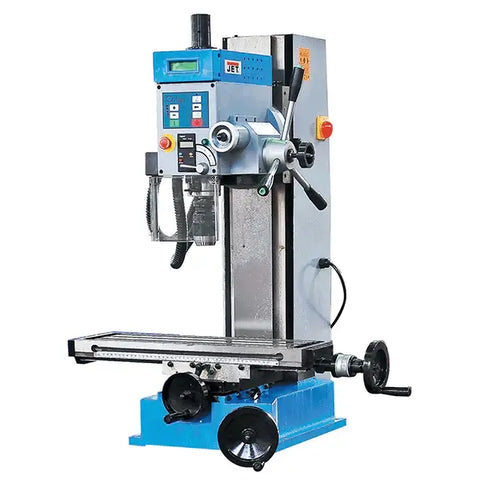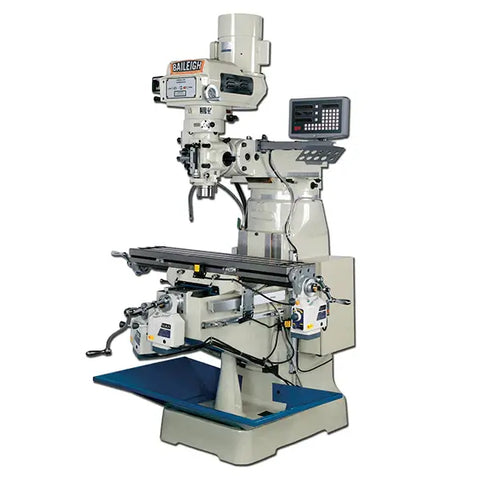
Milling Machine as a Drill Press? Know How!
Many people wonder if a milling machine can serve the same purpose as a dedicated drill press. In this article, we will explore the possibilities of using a milling machine as a drill press and provide you with the necessary information to understand its capabilities and limitations for drilling tasks.

Key Takeaways:
- A milling machine can be used as a drill press, but it has its limitations.
- Converting a milling machine for precision drilling requires specific steps.
- A dedicated drill press may be more suitable for certain drilling tasks.
- You should consider the size and power of the milling machine for drilling holes.
- Using the appropriate cutting tools is crucial when using a milling machine for drilling.
Converting a Milling Machine for Precision Drilling
When it comes to drilling tasks, a milling machine can be a versatile alternative to a dedicated drill press. By converting a milling machine for drilling purposes, you can expand its capabilities and achieve precision drilling results. Let's explore the steps involved in converting a milling machine and understand its drill capabilities.
Converting a Milling Machine to a Drill Press
To convert a milling machine into a drill press, you will need certain accessories and modifications. Here are the key steps:
- Selecting the right accessories: To convert a milling machine for drilling, you will need a drill chuck, drill chuck arbor, and a set of drill bits suitable for your drilling needs.
- Installing the drill chuck: Remove the milling machine's collet or milling cutter and attach the drill chuck to the spindle using a drill chuck arbor. Ensure the drill chuck is securely in place.
- Adjusting the speed and feed rate: Set the appropriate drilling speed and feed rate on your milling machine, taking into consideration the material and size of the drill bit.
- Securing the workpiece: Use the milling machine's table and vise to secure the workpiece firmly, ensuring stability during the drilling process.
- Performing precision drilling: With the milling machine converted into a drill press, you are now ready to perform precision drilling operations with accuracy and control.

Capabilities and Limitations
A milling machine used as a drill press has certain capabilities and limitations that are important to understand:
- Precision drilling: A milling machine offers the advantage of precise depth control, allowing for accurate and consistent drilling depths.
- Variable speed: With a milling machine, you can adjust the drilling speed to match various materials and achieve desired drilling results.
- Powerful motor: Milling machines typically have powerful motors, enabling them to handle tougher drilling tasks that may be challenging for standard drill presses.
- Workspace limitations: While a milling machine can accommodate larger workpieces for drilling, the size and design of the milling machine's table may limit the available workspace.
- Noisy operation: Compared to dedicated drill presses, milling machines tend to be louder during the drilling process due to their heavier construction and motors.
Drill Press vs. Milling Machine
When deciding between a dedicated drill press and a milling machine for your drilling needs, consider the following factors:
| Criteria | Drill Press | Milling Machine |
|---|---|---|
| Drilling Accuracy | High | High |
| Versatility | Limited | High |
| Size and Workspace | Compact; limited workspace | Larger; more workspace |
| Motor Power | Lower | Higher |
| Noise Level | Lower | Higher |
Overall, a dedicated drill press is ideal for simpler drilling tasks that require high accuracy and minimal workspace. On the other hand, a milling machine offers greater versatility, power, and precision for complex drilling operations, making it suitable for a wide range of drilling applications.

Conclusion
After thoroughly examining the topic of using a milling machine as a drill press, we have reached our conclusion. While a milling machine can certainly be used for drilling holes, it is important to consider a few key factors before deciding whether it is the right choice for your specific needs.
Firstly, milling machines are primarily designed for milling operations and have the ability to perform precise and intricate cutting tasks. However, they may not provide the same level of speed and convenience as a dedicated drill press when it comes to drilling holes.
Secondly, a milling machine requires certain modifications and adjustments to convert it into a drilling machine. This process involves installing a drill chuck and ensuring the necessary stability and alignment for accurate drilling. It is crucial to follow the manufacturer's guidelines and seek professional assistance if needed.
Lastly, the decision to use a milling machine for drilling tasks depends on the specific requirements of your projects. If precision and versatility are essential, a milling machine may prove to be a valuable asset. However, for simple drilling operations that require speed and efficiency, a dedicated drill press would be a more suitable option.
Ultimately, the choice between a milling machine and a drill press depends on your individual needs and the nature of your projects. Consider factors such as the level of precision, the range of materials you will be working with, and the complexity of the drilling tasks at hand. By carefully assessing these factors, you can make an informed decision and ensure the success of your drilling operations.

